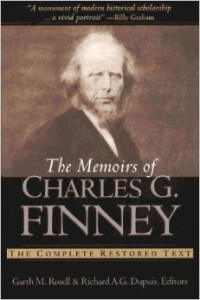Charles Finney spends quite a bit of time in his autobiography pointing out the differences between him and other ministers of the Gospel in the manner in which they communicate the message. He says he never really preaches; he just talks to the people. Other ministers, trained as they were at the colleges of the nineteenth century, would always “preach,” but never really connect with the people to whom they were preaching.
 Finney also relates his impressions of how ministers typically would avoid getting too personal, afraid they might offend people. He says that’s doing them a disservice:
Finney also relates his impressions of how ministers typically would avoid getting too personal, afraid they might offend people. He says that’s doing them a disservice:
Ministers generally avoid preaching what the people before them will understand as addressed particularly to them. They will preach to them about other people, and the sins of other people, instead of addressing them and saying, “You are guilty of these sins;” and “The Lord requires this of you.”
They often preach about the Gospel instead of preaching the Gospel. They often preach about sinners instead of preaching to them. They studiously avoid being personal, in the sense of making the impression on any one present that he is the man.
Now I have thought it my duty to pursue a different course; and I always have pursued a different course. I have often said, “Do not think I am talking about anybody else; but I mean you, and you, and you.”
Ministers told me at first that people would never endure this; but would get up and go out, and never come to hear me again. But this is all a mistake. Very much, in this as in everything else, depends on the spirit in which it is said. If the people see that it is said in the spirit of love, with a yearning desire to do them good; if they cannot call it an ebullition of personal animosity, but if they see, and cannot deny that it is telling the truth in love; that it is coming right home to them to save them individually, there are very few that will continue to resent it.
If at the time they feel pointed at and rebuked, nevertheless the conviction is upon them that they needed it, and it will surely ultimately do them great good.
The key in that passage is Finney’s caution that any pointing out of sin must be done in love, and that people need to understand the great desire is to help them eternally. What was true in Finney’s time is still true today.
